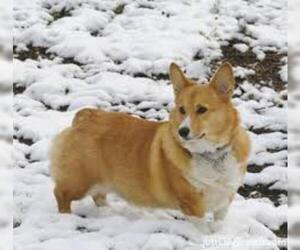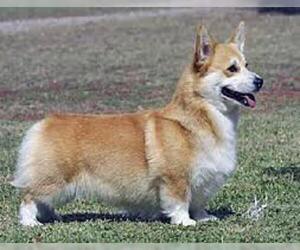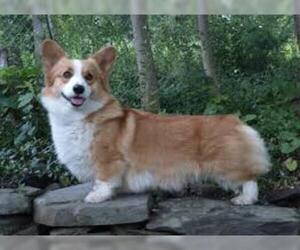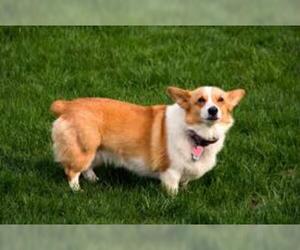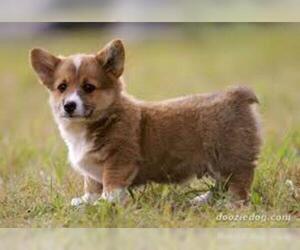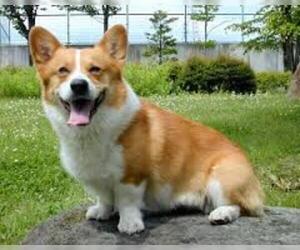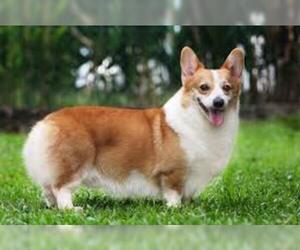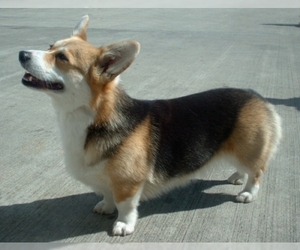
All about Pembroke Welsh Corgi dog breed
A.K.A. :Pembroke, Pem, PWC, Royal Corgi, Queen’s Corgi, Tailless Corgi, Pembroke Pup, British Corgi, Welsh Heeler, Pembroke Companion, Red Corgi, Foxy Corgi, Pembroke Scout, Regal Herder, Pocket Herder
Size
Grooming requirements
Exercise requirements
Good with other dogs
Watchdog ability
Energetic
Training requirements
Playful
Affectionate
Good with other pets
Good with children
Good with strangers
Winter
Summer
Healthiness
Protective
Life Span
| Pure Breeds | Member |
| Breeds A - Z | P |
| Breeds by Group | Herding |
| Breeds by Trait | Good With Kids Smartest Dog Breeds |
| Overview: | The Pembroke Welsh Corgi is a charming and distinctive breed, originating from Wales where they were primarily used as herding dogs to drive cattle and sheep. Known for their low-slung, athletic build, they possess a foxy face, large upright ears, and a notably short or bobbed tail. Beneath their thick, weather-resistant double coat lies a surprisingly sturdy frame, allowing for bursts of speed and agility. In terms of temperament, Corgis are generally intelligent, playful, and affectionate, making them wonderful companions. While devoted to their families, their herding instincts can sometimes manifest as a playful "nipping" at heels, which can be managed with training. Their adaptable nature makes them suitable for both families and apartment living, provided they receive adequate daily exercise and mental stimulation. However, prospective owners should be aware of common health considerations, including a predisposition to back problems (due to their elongated spine) and hip dysplasia, necessitating careful attention to weight management and proper lifting techniques. Overall, the Corgi is a delightful, spirited dog that brings immense joy to the right home. |
F.A.Q.
All You Need to Know About the Pembroke Welsh Corgi Breed
The Pembroke Welsh Corgi is a charming, intelligent, and sturdy dog originating from Wales, where they were bred to herd cattle. Known for their distinctive short legs and long bodies, these adorable canines typically weigh 25-30 pounds and stand 10-12 inches tall. Their temperament is generally outgoing, playful, and affectionate, making them excellent family pets that get along well with children and other animals. Despite their small stature, Corgis are quite active and require moderate daily exercise, including walks and playtime, to prevent boredom and maintain a healthy weight. Their thick double coat needs regular brushing (2-3 times weekly) to manage shedding. While adaptable, they can thrive in apartment living with sufficient mental and physical stimulation. Prospective owners should be aware of common health concerns like hip and elbow dysplasia, and degenerative myelopathy. A Pembroke Welsh Corgi brings joy and character to any home, offering a wonderful balance of companionship and spirited fun.Here's a concise, SEO-friendly answer for your FAQ:The average weight for a healthy adult Pembroke Welsh Corgi typically ranges from 22 to 30 pounds. Males generally fall between 25-30 pounds, while females are usually 22-28 pounds. This Pembroke Welsh Corgi weight information helps illustrate the breed's average size for potential adopters seeking a well-proportioned canine companion. Maintaining a healthy weight for Pembroke Welsh Corgi is crucial for their well-being.
How tall is a Pembroke Welsh Corgi? Understanding Pembroke Welsh Corgi Height and Average SizeWhen considering a Pembroke Welsh Corgi, one of the common questions is about their average size and how tall is a Pembroke Welsh Corgi. These charming, low-slung dogs have a surprisingly consistent build, making it easy to anticipate their adult dimensions.The average height of a Pembroke Welsh Corgi is typically between 10 to 12 inches tall at the shoulder (the highest point of their back, between their shoulder blades). This measurement applies to both males and females, as there is generally little significant variation in Pembroke Welsh Corgi height based on gender.While most Corgis fall within this 10-12 inch range, slight individual variations can occur due to genetics and lineage. Some may be a tiny bit shorter, others a fraction taller, but they will almost always stay within this generally recognized standard for the breed. This compact size contributes to their distinctive appearance and makes them well-suited for various living situations.
Pembroke Welsh Corgi Colors: A Comprehensive GuidePembroke Welsh Corgis come in a charming array of coat colors, primarily falling into shades of red, sable, fawn, and black and tan. These Pembroke Welsh Corgi colors can also be accompanied by white markings, which are a hallmark of the breed, typically appearing on the legs, chest, neck, and muzzle.The American Kennel Club (AKC) officially recognizes the following AKC recognized Pembroke Welsh Corgi colors:* Red: A rich, solid reddish-brown.* Sable: Red with black tipping on the hairs, giving a shaded appearance.* Fawn: A lighter, yellowish-tan color.* Black and Tan: A distinct pattern with a black body and tan points (eyebrows, cheeks, legs).All of these recognized colors can be seen with or without white markings. While white markings are common and accepted, an all-white coat (known as a "fluffy" or "fluff" Corgi, due to the longer coat length, not the color itself being solely white) is considered a fault in the show ring, although not for pet ownership.Beyond the officially recognized shades, there are also rare Pembroke Welsh Corgi coat types and exotic Pembroke Welsh Corgi variations that are not accepted by major kennel clubs like the AKC. These can sometimes be seen due to specific genetic combinations, often from breeders not adhering to strict breed standards. Examples include:* Blue/Dilute: A grayish or silver color, caused by a dilution gene.* Lilac: A combination of chocolate and blue dilution, resulting in a purplish-gray hue.* Merle: A striking pattern with patches of diluted color and darker solid areas, often with blue eyes. This pattern is not naturally occurring in Pembroke Welsh Corgis and suggests an outcross to another breed.* Chocolate/Liver: A solid brown color, also not a naturally occurring Pembroke Welsh Corgi color and indicative of an outcross.While these exotic Pembroke Welsh Corgi variations might appear unique, it's important to note that they are not recognized by the AKC and some, like merle, can be associated with health issues when bred irresponsibly. When considering Pembroke Welsh Corgi colors and pricing, officially recognized colors are generally more common, while rare or exotic variations may be priced higher due to their unusual appearance, but buyer beware regarding health and pedigree.
The Pembroke Welsh Corgi personality is famously a big dog in a small package! These charming and intelligent dogs are generally friendly, outgoing, and highly social. Known for their loyalty, they form strong bonds with their families and are always eager to be part of the action. Their temperament of Pembroke Welsh Corgi is typically affectionate and playful, making them wonderful companions.Corgis are highly adaptable to apartment living as long as they receive adequate daily exercise and mental stimulation. Despite their short legs, they are surprisingly energetic and enjoy walks, playtime, and even participating in dog sports. They are generally good with children, especially if raised with them and taught proper interaction, though supervision is always recommended with any breed. With other pets, Corgis are often tolerant and can coexist peacefully, particularly when socialized from a young age. Their herding instincts can sometimes surface, leading them to "herd" other animals or even family members, which is part of their endearing character. While they can be vocal, barking to alert their owners, they are also very trainable and eager to please.
The Pembroke Welsh Corgi temperament is generally described as outgoing and affectionate, making them wonderful companion dogs. They are known for being very friendly and sociable, eager to be a part of all family activities. Corgis are highly loyal to their owners and often form strong bonds, sometimes displaying a protective streak towards their home and loved ones.Their adaptable nature makes them suitable for various living situations, including apartment living, provided they receive sufficient daily exercise and mental stimulation. Corgis are typically good with children, especially if raised with them and taught proper interaction; however, their herding instincts might lead to occasional nipping at heels, which can be managed with training. They usually get along well with other pets, particularly if introduced properly and socialized from a young age.While intelligent and eager to please, Corgis can have a stubborn streak, requiring consistent and positive reinforcement training. They are not overly sensitive but thrive on attention and can become vocal (barking) if bored or left alone for extended periods. Overall, their personality traits include being intelligent, playful, and charming, bringing much joy to the right home.
Pembroke Welsh Corgi Care: Your Daily GuidePembroke Welsh Corgi care involves understanding their unique needs. These charming dogs, despite their small stature, require consistent daily maintenance.Grooming Needs: Expect moderate shedding from their double coat. Regular brushing, at least 2-3 times a week, is essential to manage loose hair and prevent matting. Occasional professional grooming may be beneficial.Exercise: While often perceived as a low-energy dog breed, Corgis do need daily exercise to stay healthy and prevent boredom. Aim for at least 30-60 minutes of moderate activity, such as walks, playtime, or short training sessions. Avoid over-exertion, especially in extreme weather.Dietary Considerations: Corgis are prone to weight gain, making weight management crucial. Feed a high-quality, age-appropriate dog food in measured portions. Avoid free-feeding and limit treats. Consult your vet for personalized dietary advice.Wrinkle and Ear Cleaning: Their adorable wrinkles can trap moisture and debris, leading to skin irritation. Regularly clean and dry facial folds. Their ears should also be checked and cleaned weekly to prevent infections.Climate Sensitivity & Brachycephalic Anatomy: Corgis are brachycephalic (short-nosed), making them susceptible to overheating. They do not tolerate extreme heat or humidity well. Provide ample shade, fresh water, and avoid strenuous exercise during hot weather. Similarly, their low-slung bodies make them sensitive to very cold ground.Common Health Concerns & Health Tips for Pembroke Welsh Corgi: Be proactive about their health. Skin issues are common, often related to allergies or poor hygiene. Regular dental care, including daily brushing, is vital to prevent periodontal disease. Due to their long backs, they are prone to intervertebral disc disease (IVDD); avoid excessive jumping. Regular vet check-ups are key for early detection and prevention of these and other potential health problems.
The Pembroke Welsh Corgi activity level is moderate. They are not couch potatoes nor hyperactive. Corgis are known for balancing short, enthusiastic bursts of energy with longer periods of rest.Typical Energy Levels: Pembroke Welsh Corgis have a surprising amount of stamina for their size, stemming from their herding lineage. They are alert, playful, and enjoy being involved in family activities.Daily Exercise Needs: To keep a Pembroke Welsh Corgi healthy and well-behaved, they require at least 30-60 minutes of daily exercise. This can include two to three shorter walks, playtime in a secure yard, or engaging in mentally stimulating activities. Consistent exercise prevents boredom and destructive behaviors.Playtime Preferences: Corgis love to play! They enjoy fetch, tug-of-war, and can excel in dog sports like agility, obedience, and herding trials (even with their short legs!). Interactive toys and puzzle feeders are also great for their intelligent minds.Limitations Due to Brachycephalic Anatomy: While active, how active are Pembroke Welsh Corgi is influenced by their brachycephalic (short-nosed) anatomy. They are prone to overheating, especially in warm weather or during strenuous exercise. It's crucial to avoid overexertion and ensure they have access to shade and water. Always supervise their activity and bring them indoors if they show signs of distress.Suitability: Pembroke Welsh Corgis are suitable for active families who enjoy daily walks and playtime. They can also adapt to low-energy households, provided their moderate exercise needs are consistently met through shorter, regular outings and indoor engagement. They thrive on companionship and thrive when included in family life, making them excellent companions for those willing to provide consistent, appropriate exercise.
Breed Breakdown: What Experts Say About the Pembroke Welsh Corgi
I would rate the Pembroke Welsh Corgi's "Size" trait as a 3.While not fitting into the "toy" category, Corgis are distinctly on the smaller side of the canine spectrum. Their average height, typically around 10-12 inches at the shoulder, places them significantly below medium-sized breeds. Their weight, ranging from 25-30 pounds, is also moderate, but their long, low-slung body structure, while sturdy, doesn't translate to a bulky or large presence. When compared to other popular companion dogs, they are noticeably smaller than Golden Retrievers, German Shepherds, or even many terrier breeds. This compact size makes them exceptionally well-suited for apartment living, as they don't require vast amounts of space to move around comfortably. Their portability also makes them excellent travel companions, fitting easily into pet carriers and not overwhelming smaller vehicles. They are an ideal choice for households with space constraints where a larger dog simply isn't feasible.
I would rate the Pembroke Welsh Corgi's grooming requirements as a 6 out of 10.While their short, double coat might suggest ease, it's quite deceptive. Corgis are notorious for their high shedding frequency, especially during seasonal changes, requiring frequent brushing (several times a week, daily during shedding season) to manage the loose fur and prevent mats in the undercoat. Their short legs and tendency to be low to the ground mean they can pick up dirt easily, leading to more frequent bathing than some other short-coated breeds. While they don't typically have deep skin folds that require extensive daily cleaning, their body shape can sometimes lead to localized moisture, so occasional checks and cleaning are beneficial. Ear cleaning is standard, needing a check weekly and cleaning as needed. Nail trimming is crucial and needs to be done regularly, usually every 2-4 weeks, as overgrown nails can lead to discomfort and foot problems. They aren't particularly prone to extensive skin issues or allergies more than other breeds, but the density of their coat does mean that if skin problems do arise, they can sometimes be a bit more challenging to spot and treat early. Overall, compared to some other companion dogs, Corgis require consistent and regular grooming to manage their shedding and maintain their coat and general hygiene, pushing them into the moderately high-maintenance category rather than easy-care.
I would rate the Pembroke Welsh Corgi's exercise requirements as a 6 out of 10. While not needing the extensive physical demands of a working breed like a Border Collie, Corgis are far from sedentary and thrive on a good amount of daily activity. Their herding background means they possess surprising bursts of energy and a keen desire for purposeful movement. They typically require at least 30-60 minutes of moderate exercise daily, which can be broken into several walks, active playtime, or engaging in activities like fetch. They have a sturdy build and enjoy sustained walks, though their short legs mean they won't be setting any speed records. While not severely brachycephalic, their slightly shortened snouts do mean owners need to be mindful of overheating during strenuous exercise, especially in warm weather. Corgis are intelligent and benefit greatly from mentally stimulating activities, so structured routines that incorporate training, puzzle toys, and even beginner agility can be highly beneficial to prevent boredom and destructive behaviors. They are generally adaptable but will become overweight and potentially destructive if their exercise needs are neglected, indicating they require more than just minimal activity to stay healthy and mentally stimulated.
I'd rate the Pembroke Welsh Corgi's "Watchdog Ability" at a 7 out of 10.Corgis are exceptionally alert and possess a keen awareness of their surroundings. They are quick to notice anything out of the ordinary, whether it's an unfamiliar sound, a person approaching the house, or even a leaf blowing in an unusual way. This high level of alertness translates into frequent barking, which is their primary method of "deterrence." They will definitely let you know when someone is at the door, walking past the house, or even just existing within earshot. Their territorial instincts are present; they consider their home and family their domain and will voice their disapproval of perceived intruders.While they are highly vocal and excellent at providing early warnings, they are not typically a breed that would physically deter an intruder. Their small size and generally friendly nature mean that while they might bark ferociously, a determined intruder is unlikely to be intimidated beyond the initial surprise of a low-to-the-ground bark machine. However, their consistent and insistent barking serves as a significant alarm system, making them incredibly effective at alerting their human companions to potential threats. They are definitely more than a passive companion; they are a living, breathing, and barking doorbell and alarm that will consistently provide meaningful early warnings in a home environment.
I would rate the Pembroke Welsh Corgi's "Good with Other Dogs" trait as a 7.Corgis are generally quite sociable and enjoy canine company, often displaying a playful and curious demeanor around other dogs. They tend to adapt well to multi-dog households, especially if raised with other canines or properly socialized from a young age. Their sturdy build and confident personality allow them to interact with dogs of various sizes, and while they can be energetic, they typically adjust their play style to suit their companions. However, the rating isn't a perfect 10 because Corgis, being intelligent and sometimes prone to independent thought, can occasionally exhibit a "herding" instinct towards other dogs, which might manifest as nipping at heels or trying to control their movement. Without proper socialization and consistent training, this can sometimes be misinterpreted by other dogs or escalate into minor squabbles. Furthermore, some individual Corgis, particularly unneutered males, might display bossy or dominant tendencies if not appropriately managed, requiring careful introductions to strong-willed or reactive dogs. They thrive in canine company, but benefit significantly from early and ongoing socialization to ensure they remain polite and well-adjusted companions.
I'd rate the "Energetic" trait of the Pembroke Welsh Corgi a 7 out of 10.While not hyperactive in the vein of a Border Collie or Jack Russell Terrier, Corgis are far from couch potatoes. They possess a surprisingly robust and enduring energy for their size, a remnant of their herding dog lineage. They have a naturally active disposition, thriving on regular play sessions, walks, and opportunities to "work" their brains. Their playfulness is high, enjoying games of fetch, tug, and even chasing. They definitely need consistent physical stimulation to prevent boredom and maintain good health.However, their brachycephalic (short-nosed) anatomy plays a significant role in their stamina and exercise tolerance, preventing them from reaching the extremely high energy levels of some other breeds. While they can participate in various outdoor activities like hiking (on moderate trails) and agility, they are more susceptible to overheating and respiratory distress during intense or prolonged exertion, especially in warm weather. Owners must be mindful of this limitation, providing breaks and ample water. So, while they are naturally active and enjoy vigorous bursts of energy, their physical structure places a ceiling on their endurance compared to breeds designed for sustained, high-intensity athletic pursuits. They are more energetic than many smaller companion breeds but less so than true working or sporting dogs.
I would rate the Pembroke Welsh Corgi's "Training Requirements" at a 6.While Corgis are intelligent and eager to please in many aspects, their strong-willed and independent nature can present challenges, pushing them beyond a "very easy" rating. They are generally responsive to commands when they understand what's being asked and when there's a clear incentive, making positive reinforcement highly effective. However, their attention span can waver, particularly with repetitive drills, and they possess a good dose of stubbornness, a common trait in herding breeds. Consistency is absolutely paramount; any lapse in rules or boundaries will be quickly exploited. They are generally beginner-friendly if the owner is committed to consistent, firm-but-fair training from a young age, but they thrive with structured routines and benefit greatly from owners who understand how to channel their herding instincts into productive activities rather than letting them boss around the household. They don't necessarily require *experienced* handling, but they do demand *dedicated* and *knowledgeable* handling to ensure they become well-behaved companions rather than mischievous, vocal dictators.
I'd rate the Playful trait of the Pembroke Welsh Corgi a solid 9 out of 10.Corgis are incredibly spirited and fun-loving, brimming with an enthusiastic zest for life. They possess a naturally high activity level for their size, always ready for a game of fetch, a good chase in the yard, or a stimulating puzzle toy. Their love for interaction is evident in their frequent "demands" for attention, often using their expressive barks and charming nudges to initiate playtime. They respond to toys and playtime with remarkable gusto, often "talking" to their toys or performing playful nips and bows. Their overall enthusiasm in daily life is infectious; they approach walks, meals, and even car rides with an undeniable, joyous bounce. Compared to many other companion dogs, Corgis are decidedly more spirited and less laid-back, always up for an adventure or a good romp, even well into their senior years.
I would rate the Pembroke Welsh Corgi's "Affectionate" trait a 9 out of 10.Corgis are incredibly loving and people-oriented dogs that thrive on human companionship. They have a strong desire to be part of the family and will often follow their owners from room to room, eager to be involved in whatever is happening. While not always the most enthusiastic lap dogs due to their independent streak and tendency to "herd" their family, they absolutely adore physical closeness and will often lean against you, nudge for pets, or settle near your feet. Their loyalty is unwavering, and they are surprisingly sensitive to their owner's emotions, often offering comfort in their own quiet way. They are truly happiest when surrounded by their loved ones and actively seek out attention and interaction, making them a breed that absolutely thrives on affection rather than being independent compared to other companion dogs.
I'd rate the "Good with Other Pets" trait of the Pembroke Welsh Corgi an 8 out of 10.Pembroke Welsh Corgis are generally very sociable dogs and tend to get along well with other pets, including dogs and cats, especially when properly socialized from a young age. Their herding instincts, while present, are often directed more towards people and less towards a strong prey drive that would endanger smaller animals. They are typically playful and adaptable, thriving in multi-pet households where they can be part of the "pack."However, the rating isn't a perfect 10 because, like any breed, individual personalities vary. While naturally sociable, early and consistent socialization is still crucial to ensure harmonious relationships. Without it, some Corgis might display mild resource guarding tendencies (especially over food or favored toys) or try to "herd" smaller pets, which, while not aggressive, can be annoying to the other animal. Supervision during initial introductions and ongoing training to reinforce good behavior are beneficial for a truly peaceful coexistence.
I'd rate the Pembroke Welsh Corgi's "Good with Children" trait a 7 out of 10.Corgis are generally good-natured and playful dogs, making them enjoyable companions for children. They have a sturdy build that can withstand a fair amount of enthusiastic play, and their natural herding instincts often translate into a desire to "keep the pack together," which can be charming with respectful children. They are typically tolerant of noise and the hustle and bustle of a family home. However, it's important to remember their herding heritage also means they can be prone to nipping at heels, especially with very young children who are running around. While not aggressive, this instinct needs to be managed with proper training and early socialization. They thrive in a family setting when both the dog and children are taught appropriate boundaries and interactions. They are naturally affectionate but benefit significantly from consistent supervision with younger children to ensure positive experiences for everyone and prevent any unintended herding behaviors from becoming an issue. They are more suited to families who can provide clear direction and gentle guidance.
I would rate the Pembroke Welsh Corgi's "Good with Strangers" trait a 7 out of 10.Pembroke Welsh Corgis are generally friendly and outgoing dogs, but they aren't typically indiscriminately sociable with every single stranger they encounter. They are naturally alert and have a history as herding dogs, which can manifest as a watchful and sometimes vocal nature when new people are present. While not usually aggressive or overtly unfriendly, they might initially be a bit reserved or bark to announce an arrival before quickly warming up. Their friendliness tends to blossom once they've assessed the situation and received a positive signal from their owner. With proper socialization from a young age, most Corgis are very adaptable and well-behaved in public or with guests, enjoying attention once they're comfortable. However, without adequate socialization, their natural wariness could lean towards more persistent barking or shyness. They are more naturally outgoing than reserved, but training and consistent positive exposure are definitely beneficial in ensuring they are consistently comfortable and welcoming towards unfamiliar adults.
I would rate the Pembroke Welsh Corgi's "Winter" tolerance at a 6.While Corgis possess a thick double coat that provides a good degree of insulation and their stocky build can retain some heat, they are still a small-to-medium breed. Their low-slung bodies are closer to the cold ground, increasing heat loss. They also lack significant body fat compared to breeds specifically bred for extreme cold. Furthermore, their slightly brachycephalic (short-nosed) anatomy can make it more challenging to warm incoming air in very frigid conditions, potentially leading to respiratory discomfort or issues with exercise in extreme cold. They can certainly enjoy outdoor activities in moderately cold climates for reasonable durations, but they are not built for prolonged exposure to severe winter weather, nor are they immune to the risks of hypothermia.Compared to many other companion dogs, Corgis *do* require special care during winter months, particularly in genuinely cold climates. While they won't shiver and want to go inside after a minute like a Chihuahua, they aren't Labradors who can play in the snow for hours without issue. Owners should be mindful of temperature drops, provide insulated coats or sweaters for extended outings, limit time spent outdoors in very cold or windy conditions, and always ensure they have a warm, dry place to rest. Their low stature means they can get wet and cold quickly from snow and slush, so paw protection (booties) can be beneficial to prevent frostbite and protect against ice melt chemicals.
Rating: 3The Pembroke Welsh Corgi has a low tolerance for summer heat. While not as severely brachycephalic as some breeds, their shorter snouts can still compromise their ability to pant effectively and cool down. They have a thick double coat that, while providing some insulation, can quickly become a heat trap in warm weather. Corgis are prone to overheating and heatstroke, especially during exercise or extended outdoor exposure. Their low-to-the-ground stature also means they absorb more radiant heat from the ground. Compared to many other companion dogs, Corgis require significant special care in summer months, including strict limitations on outdoor activity during peak heat, access to air conditioning or cool environments, and vigilant monitoring for signs of heat stress.
I would rate the Pembroke Welsh Corgi's "Healthiness" trait as a 5 out of 10.While not inherently fragile, Corgis are prone to a significant number of breed-specific health issues that prevent them from being considered truly robust. Their characteristic long backs and short legs make them highly susceptible to intervertebral disc disease (IVDD), which can be debilitating and expensive to treat. Hip and elbow dysplasia are also common concerns, contributing to joint problems later in life. Eye conditions like progressive retinal atrophy and general issues like von Willebrand's disease are also seen. Furthermore, their body shape can predispose them to obesity if not carefully managed, which exacerbates other health problems. Responsible breeding practices, including health testing of parent dogs for these conditions, can certainly mitigate some risks, and preventive care, especially weight management, is crucial. However, even with diligent care, the genetic predispositions mean they are often higher-maintenance in terms of potential veterinary needs compared to some other companion dog breeds. Their life expectancy, generally 12-15 years, is respectable, but the quality of that life can be significantly impacted by these chronic conditions.
I'd rate the "Protective" trait of the Pembroke Welsh Corgi breed a 7 out of 10.Corgis are highly alert and possess strong territorial instincts, making them excellent watchdogs. They are quick to bark at anything perceived as unusual or threatening, whether it's a delivery person or a squirrel in the yard, and their low, booming bark can be surprisingly intimidating for their size. Their fierce loyalty to their owners drives this protective behavior, and they will readily position themselves between their family and perceived threats. They are generally wary of strangers until properly introduced, observing new people with suspicion.However, while they are fantastic watchdogs, their small size and friendly nature mean they are not truly guard dogs capable of offering meaningful physical protection in a household setting. Their "protection" primarily comes from their vocal alerts and attempts to deter through barking, rather than actual physical intervention. They are undeniably more of a companion dog, but one with a highly effective alarm system.
I would rate the "Life Span" trait of the Pembroke Welsh Corgi a 7 out of 10.Pembroke Welsh Corgis are generally considered a long-lived breed compared to many other companion dogs, with an average life expectancy typically ranging from 12 to 15 years, and some individuals living even longer. This positions them favorably when compared to breeds with much shorter lifespans. While they are prone to certain health issues like intervertebral disc disease (IVDD) due to their long backs and short legs, and hip/elbow dysplasia, responsible breeding practices can significantly reduce the incidence of these genetic predispositions. Furthermore, owners who provide proper nutrition, regular exercise, and preventative veterinary care can further contribute to a longer and healthier life for their Corgi. Their robust nature and generally good health contribute to this above-average rating.
Pembroke Welsh Corgi Puppies for saleSee all puppies for sale
Pembroke Welsh Corgi Dogs for adoptionSee all dogs for adoption
Pembroke Welsh Corgi BreedersSee all breeders
Similar Dog Breeds for Pembroke Welsh Corgi
Breed Mixes of Pembroke Welsh Corgi
Quick Breed Selector 0 - not important, 1 - smallest, 10 - largest
Variants & Mistakes :Pembrok Welsh Corgi, Pembrock Welsh Corgi, Pembroke Welh Corgi, Pembroke Wlesh Corgi, Pembrok Welh Corgi, Pembrock Welh Corgi, Pembroke Welsh Corgy, Pembroke Welsh Corki, Pembroke Welsh Corgie, Pembrok Welsh Corgy, Pembrock Welsh Corgy, Pembroke Welh Corgy, Pembroke Wlesh Corgy, Pemroke Welsh Corgi, Pembroje Welsh Corgi, Pembroke Wlsh Corgi, Pemroke Wlsh Corgi, Pembroje Wlsh Corgi, Penbroke Welsh Corgi, Pemrock Welsh Corgi
